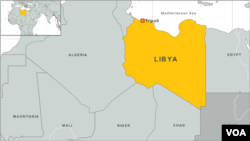CAIRO —
Libya's interim Prime Minister Abdullah al-Thani, who has held the post for less than three weeks, has excused himself from forming a new government, after he and his family came under attack at their home on Saturday.
Thani announced Sunday that he is effectively giving up his post, adding an extra level of uncertainty to an already unsettled political situation.
Thani said in a statement on the government's website that he would not head the next Cabinet, but would stay on in a caretaker capacity until the new government is in place. He said he made the move to “protect the interests of the country,” and “avoid dragging different sides into a conflict,” in which “everyone would lose.”
Government spokesman Ahmed al Amine indicated that Thani was not stepping down immediately, but an attack on his family had prompted him to seek a successor.
He says Thani has not resigned, but has excused himself from forming the new government. The prime minister and his family, he added, came under attack by a group of armed militiamen at their home late Saturday.
Tripoli city council head Sadat al Badri condemned the attack against the interim prime minister, calling it “a desperate attempt to destabilize the country.” He also demanded “armed militias evacuate Libyan cities” and return them to the people.
Former prime minister Ali Zeidan, who was given a vote of no-confidence on March 11th, was briefly kidnapped by militiamen, earlier this year. The Corinthia Hotel, which has served as a residence for various government officials, also came under attack several times.
University of Tripoli Political Science Professor Ahmed al Atrash tells VOA that he is not expecting any major political disruption from Thani's departure.
"A minister from the same Cabinet may continue until the election for the next three or four months, taking into account the agreement among the council members and the interim government," he said.
He added that the Libyan public is expecting fresh elections for a new parliament in the months to come, so the current state of change will be taken in stride by most people.
Meanwhile, the trial of former leader Moammar Gadhafi's two sons and several former prime ministers got under way briefly in the capital Tripoli, but was quickly adjourned until April 27th. Investigators say they need more time to finish their cases. Neither of Gadhafi's sons was present at the trial session.
Thani announced Sunday that he is effectively giving up his post, adding an extra level of uncertainty to an already unsettled political situation.
Thani said in a statement on the government's website that he would not head the next Cabinet, but would stay on in a caretaker capacity until the new government is in place. He said he made the move to “protect the interests of the country,” and “avoid dragging different sides into a conflict,” in which “everyone would lose.”
Government spokesman Ahmed al Amine indicated that Thani was not stepping down immediately, but an attack on his family had prompted him to seek a successor.
He says Thani has not resigned, but has excused himself from forming the new government. The prime minister and his family, he added, came under attack by a group of armed militiamen at their home late Saturday.
Tripoli city council head Sadat al Badri condemned the attack against the interim prime minister, calling it “a desperate attempt to destabilize the country.” He also demanded “armed militias evacuate Libyan cities” and return them to the people.
Former prime minister Ali Zeidan, who was given a vote of no-confidence on March 11th, was briefly kidnapped by militiamen, earlier this year. The Corinthia Hotel, which has served as a residence for various government officials, also came under attack several times.
University of Tripoli Political Science Professor Ahmed al Atrash tells VOA that he is not expecting any major political disruption from Thani's departure.
"A minister from the same Cabinet may continue until the election for the next three or four months, taking into account the agreement among the council members and the interim government," he said.
He added that the Libyan public is expecting fresh elections for a new parliament in the months to come, so the current state of change will be taken in stride by most people.
Meanwhile, the trial of former leader Moammar Gadhafi's two sons and several former prime ministers got under way briefly in the capital Tripoli, but was quickly adjourned until April 27th. Investigators say they need more time to finish their cases. Neither of Gadhafi's sons was present at the trial session.




